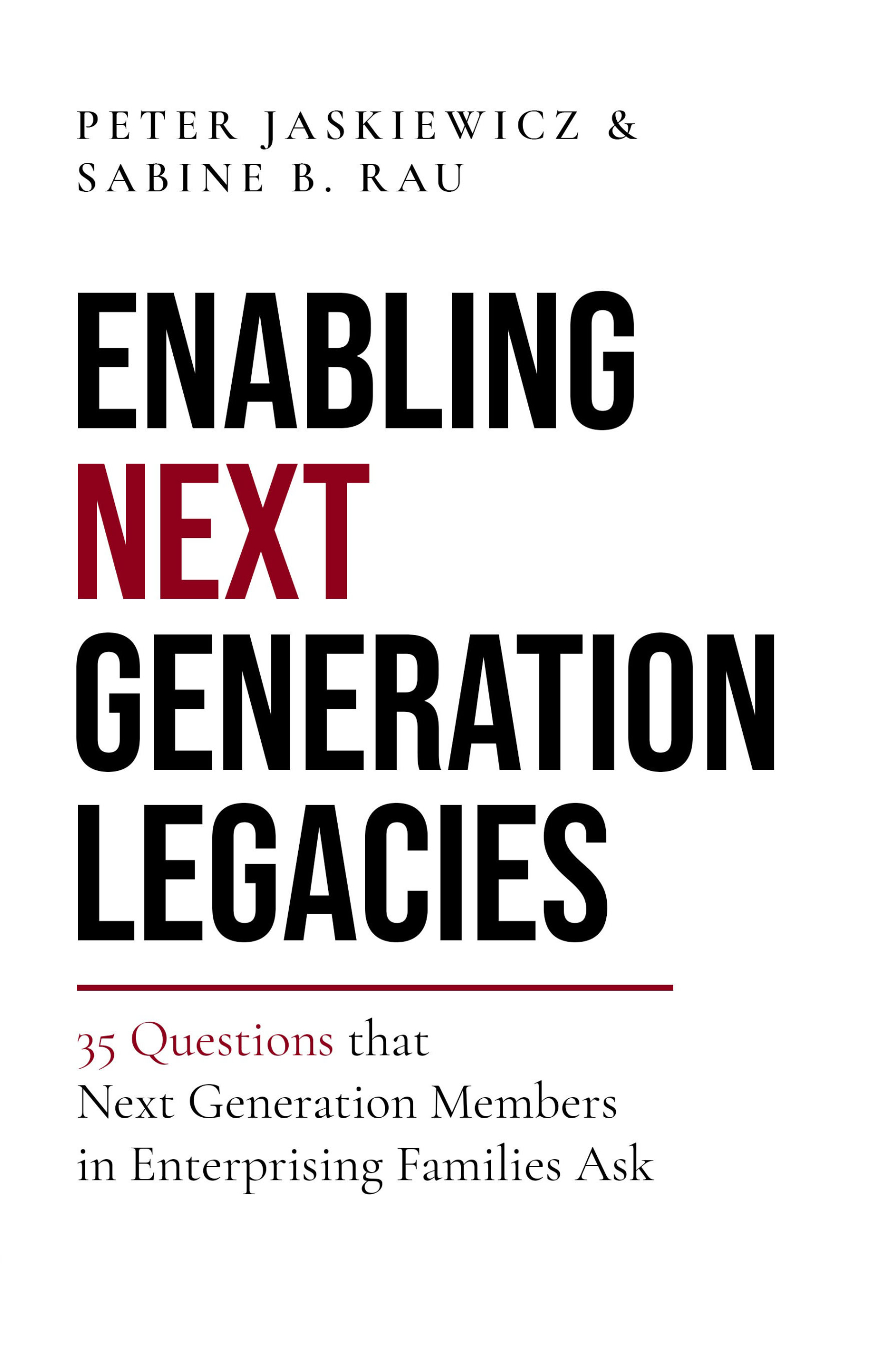Extrait du livre "Enabling Next Generation Legacies" : "How Can I Prepare Myself to Work Effectively With My Fellow Family Owners?"

Au cours des prochains mois, le Carrefour du savoir Telfer publiera des extraits du livre intitulé Enabling Next Generation Legacies: 35 Questions That Next Generation Members in Enterprising Families Ask.
 Résultat de nombreuses années de recherche et d’expérience pratique à l’échelle internationale, cet ouvrage s’intéresse aux défis particuliers auxquels font face les entreprises familiales.
Résultat de nombreuses années de recherche et d’expérience pratique à l’échelle internationale, cet ouvrage s’intéresse aux défis particuliers auxquels font face les entreprises familiales.
Peter Jaskiewicz et Sabine Rau, membres du corps professoral de l’École de gestion Telfer, ont réuni des universitaires, des familles entrepreneuriales ainsi que des praticiennes et praticiens mondialement reconnus afin de répondre, de manière brève, concise et néanmoins pertinente, aux questions les plus pressantes auxquelles est confrontée la prochaine génération.
Fort de l’apport de quelque cent collaboratrices et collaborateurs issus de 27 pays, le livre présente les pratiques exemplaires, des exemples concrets ainsi que des questions essentielles visant à susciter la réflexion. Les commentaires d’experts proviennent de membres des entreprises familiales les plus importantes du monde, dont Auchan (France), Saputo (Canada), and Sabra (Israël), ainsi que de divers spécialistes universitaires travaillant dans des écoles de gestion renommées telles que Kellogg, IMD, et INSEAD.
Vous trouverez ci-dessous la réponse à une question pressante qui se pose aux entreprises familiales (dans sa version originale anglaise).
How Can I Prepare Myself to Work Effectively With My Fellow Family Owners?
Response by Peter Jaskiewicz and Elizabeth Tetzlaff, Canada
A PricewaterhouseCoopers survey of 956 Next Gens in 2019 from sixty countries and territories found that Next Gens have big plans.[i] With 70 percent of these Next Gens actively engaged in the family business, by 2025; 41 percent expect to be executive directors (i.e., owner-managers); 29 percent anticipate being majority shareholders; 15 percent plan on being involved in business governance, and the other 15 percent expect to become non-executive directors. In other words, 85 percent share the ambition of becoming owners of their families’ businesses.
As Marvel’s Uncle Ben reminds Peter Parker, “with great power comes great responsibility.”[ii] Ambition, like power, has its own counterweight—obstacles. So, it coul d be said, “with great ambition come great obstacles.” Despite their ambition, 52 percent of Next Gens have yet to be given the responsibility of a special project, and despite being “deeply engaged” in the family business, 64 percent of them admit that they are not being used as a sounding board. Worse still, 10 percent of these Next Gens feel unheard: “I make suggestions, but they are hardly ever listened to.” These statistics echo the sentiment that Next Gens shared with us: We are ambitious and want to work effectively as owners, but how can we prepare for that ourselves?
Ambition, Abilities, Approach, and Acceptance
In our experience, effective Next Gens have their “A game,” which includes four As—ambition, abilities, approach, and acceptance.[iii]
Ambition. To have ambition is to have determination and a strong desire to achieve or see something to completion.[iv] For Next Gens, this desire could speak not only to their desire to succeed as the successor, but also their determination to improve upon the advancements made in the family firm. Indeed, on one hand, we have met Next Gens who lacked ambition, stating: “I will never be as good as the incumbent.” On the other hand, we have met ambitious Next Gens who were keen to learn how to accelerate their own development and were eager to leave their mark. For instance, they talked about projects to reduce carbon emissions of the family firm, unify the family before spinning off outdated business units, or implement plans in the family office to sell investments that do not comply with environmental and social standards. Without their ambition, these behaviors might not take place. Ambition is thus the first necessary quality that Next Gens need to possess. However, in order for it to be beneficial and not destructive, ambition, like energy, needs a value-oriented direction.
Abilities. Abilities help to harness ambition and give it direction. Abilities are commonly equated with accounting degrees or strategy MBAs. However, the abilities that make effective family owners are much broader and include having good people skills, being able to motivate others on the team, having healthy coping mechanisms to deal with stress, and being able to approach conflict constructively. In his biography, Charles Bronfman—the second-generation former co-leader of Seagram—describes many effective decisions that he and his brother Edgar made, but Charles also discloses that his biggest mistake was to suppress his thoughts when his brother and his brother’s son brought forward proposals that were driven by their personal interests rather than business sense.[v] Charles says that he saw the problems of the family’s investment ideas but admitted that he did not use his veto right because he felt pressured to comply and wan ted to avoid conflicts. From Charles’s story, we learn how important it is for family owners to have an encompassing range of soft skills. We can also see that ambitions that are not properly guided can ruin the family business.
Approach. Having the right abilities equips the owner with a foundation onto which they can add an effective approach to decision-making processes in family business. In our experience, as long as all parties involved feel that their voices are heard and accounted for, family owners are able to make controversial decisions (e.g., How do we deal with an underperforming family manager?)—even if they do not fully agree with each other to start with. Otherwise stated, Next Gens need to understand what constitutes a fair process, communicate, and then implement such processes.[vi] We have witnessed, firsthand, good decisions failing because the family did not use an approach that allowed those involved to feel that they were all on equal footing in the decision-making process.
Acceptance. Finally, having the ambition and the ability together with the right approach leads Next Gens to the door, but in order to open it, a key is necessary: acceptance. It is not uncommon to experience the disheartening feeling of meeting everyone, having them congratulate you on the new board appointment, and then ignore you for the rest of the meeting (or the next five-to-ten years). This does not mean that the Next Gen will not be accepted, it simply means that Next Gens will need to accept that it is necessary to prove themselves in order to be recognized. Learning about ownership can look like attending family council meetings, being a board observer (visitor) in board meetings, and assuming formal roles in student groups, local not-for-profits, or regional family business associations. Rather than passively waiting for acceptance, Next Gens need to proactively work tow ard it. In other words, if Next Gens are able to commit to proving themselves outside and inside of the family business, then they will be more likely accepted as Next Gen leaders.
In summary, Next Gen owners’ effectiveness is an outcome of their ambition, abilities, approach, and acceptance. If the senior generation does not share influence and does not treat Next Gens as owners, the latter will be less effective. Similarly, fellow Next Gen owners can be destructive. If they are poorly prepared and immature, they can torpedo processes and push away effective Next Gens. Therefore, families and Next Gens need to do their part to ensure that none of the future owners become the Achilles heel of the family and the bottleneck of their enterprise(s). Families whose Next Gens bring their “A game” are more likely to make a difference for their families, enterprises, and communities.
Premier directeur de l’Institut de l’héritage des entreprises familiales, le professeur Peter Jaskiewicz a coécrit le livre Enabling Next Generation Legacies: 35 Questions that Next Generation Members in Enterprising Families Ask. Il est professeur titulaire en entreprises familiales à l’École de gestion Telfer, où il dirige la Chaire de recherche en Entrepreneuriat durable.
Elizabeth Tetzlaff est candidate au doctorat à l’École de gestion Telfer. Ses recherches portent sur les questions de santé mentale au sein des familles d’entrepreneures et d’entrepreneurs, de même que leurs effets sur la santé et la vitalité des entreprises familiales. Elle travaille en parallèle à une étude financée par le Conseil de recherches en sciences humaines du Canada (CRSH) sur l’influence qu’exercent les différences au sein des familles sur la réussite et la pérennité de l’entreprise familiale.
L’ouvrage intitulé Next Generation Legacies est offert en version numérique dès maintenant. La sortie de l’exemplaire imprimé est prévue en février 2022. Visitez le site www.35questions.com pour plus de détails.
Références
[i]« Agents of change: Earning your licence to operate », PwC’s Global NextGen Survey (Allemagne : PwC, 2019), 1-26.
[ii] Spider-Man, film de Sam Raimi (2002; Culver City, CA : Columbia TriStar Home Entertainment), DVD.
[iii] Mira Bloemen-Bekx, Enriching the Early Phases of the Succession Process: An Explanation of the Role of Social Mechanisms in Business Families (thèse de doctorat, Hasselt University, 2019). Note de l’auteure et de l’auteur : Mira Bloemen-Bekx parle d’ambition, d’aptitudes et d’acceptation.
[iv] Définition en anglais : Oxford English Dictionary, 3rd ed. (2001), s.v. « ambition ».
[v] Charles Bronfman et Howard Green, Distilled: A Memoir of Family, Seagram, Baseball, and Philanthropy (New York : HarperCollins, 2017).
[vi] Ludo Van der Heyden, Christine Blondel et Randel S. Carlock, « Fair Process: Striving for Justice in Family Business », Family Business Review 18, no 1 (mars 2005), 1-21.